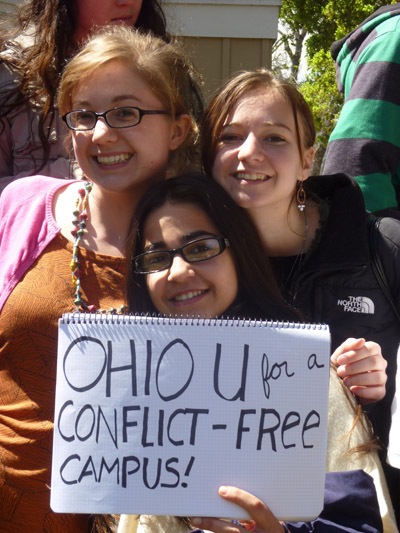
As testament to the growing influence of students in the movement to end the trade in conflict minerals from Congo, Stanford University recently hosted the very first gathering aimed at sharing and coordinating efforts to create conflict-free campuses. Students from 12 schools across the country gathered in Palo Alto, California, for a conference to learn more about the conflict minerals issue, what different companies, NGOs, and countries are doing to make a difference, and how a statement from their respective universities on the purchasing of conflict-free electronics can incentivize key stakeholders to work for peace in Congo.
Enough sent a small team to the conference to share in-depth knowledge on the conflict minerals trade in Congo and to frame the Conflict-Free Campus Initiative within the broader movement dedicated to building a constituency for conflict-free products and ultimately, a legitimate mining sector in Congo that will exclude the militias and rebel groups who are fighting for control of lucrative mines and destroying the fabric of communities in the mining areas.
The weekend-long conference was entirely organized and run by student members of the Stanford STAND chapter and featured Chip Pitts, a lecturer at Stanford Law School who is a longtime human rights activist and previously served as the chief legal officer of Nokia. Stanford was the first university to pass a conflict-free resolution last spring, which helped spark the conflict-free campus movement across the country. Currently, nearly 45 schools are participating in the initiative, including Westminster College and the University of Pennsylvania, who have both passed resolutions.
The overarching message of the conference was that students can make a difference by leveraging their power as consumers to influence electronics companies to take action against the use of conflict minerals. The equation is potentially unstoppable: Students are a coveted demographic of electronics companies; universities hold large contracts with electronics companies; students can demand that their universities pass a resolution to commit to purchasing conflict-free electronics on campuses; and the result is the demand for conflict-free products is heard by electronics companies who then devote the resources necessary to trace and audit their supply chains.
Many of the student leaders steering their campuses in support of conflict-free mining in eastern Congo attended the conference. They came with inspiring ideas on how to grow the movement, success stories from passed resolutions, and appeals for help on how to connect with an unresponsive student body or administration. No matter what stage they’re at in developing a resolution on their campuses, students came because they understand their connection to the conflict in Congo, recognize their ability to effect change in Congo, and believe in the possibility of a conflict-free mining sector that will finally benefit local communities in Congo.
Are you working on a conflict-free resolution but were unable to attend the conference? Contact Alex Hellmuth at ahellmuth[at]enoughproject.org or visit the Raise Hope for Congo website to find out more about the Conflict-Free Campus Initiative.
Photo: Students from Ohio University at Stanford's conference (Enough/Alex Hellmuth)

